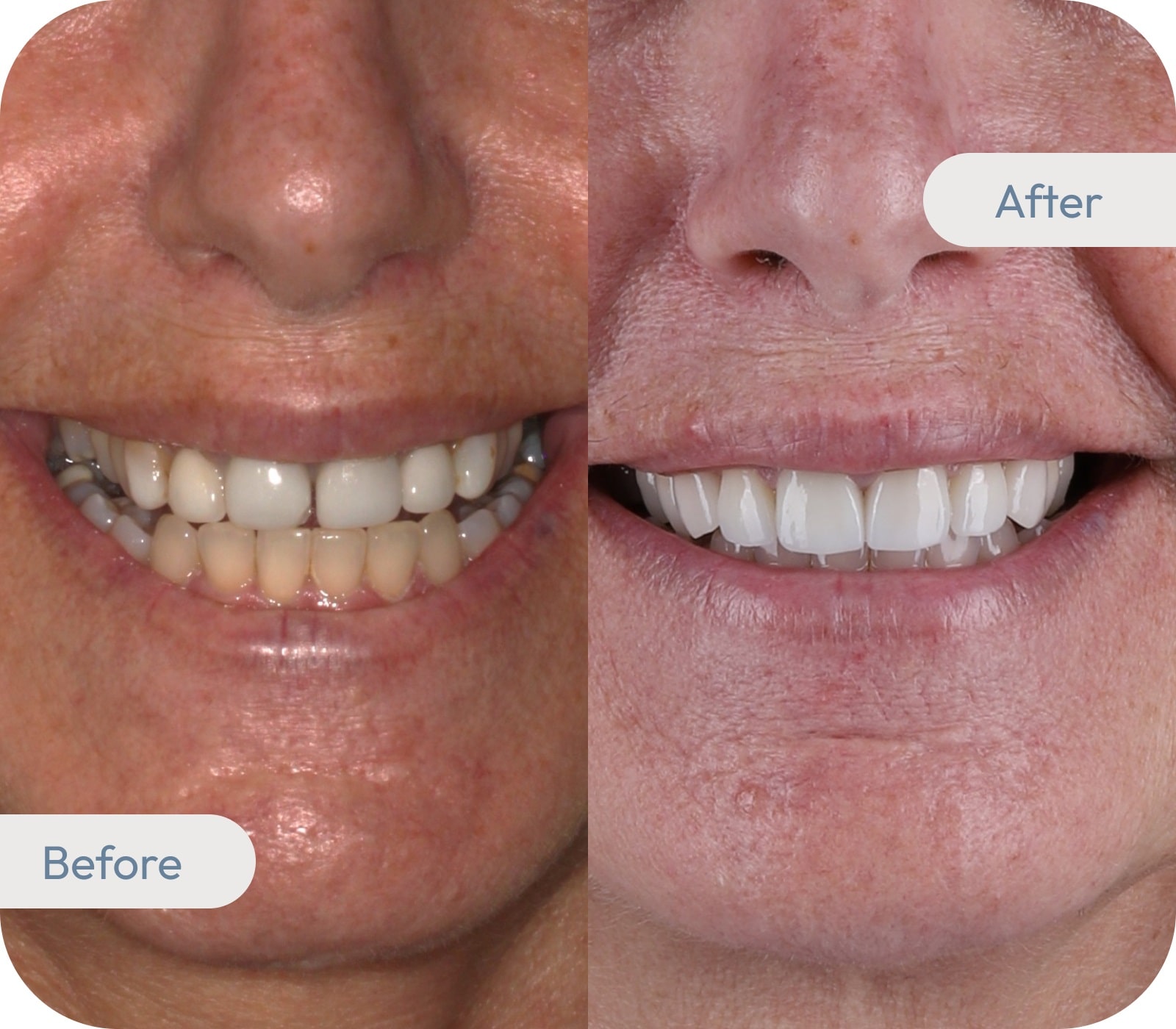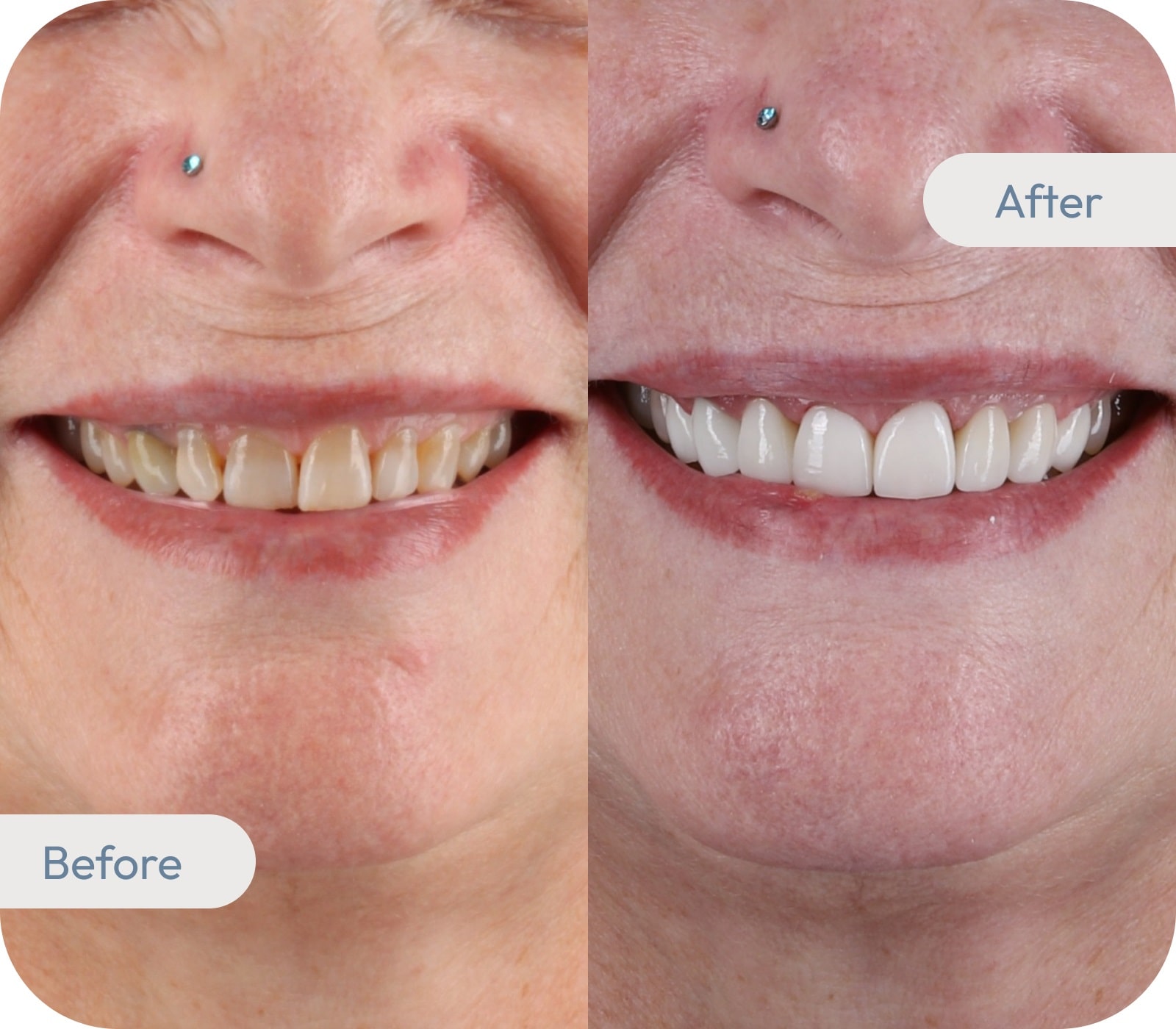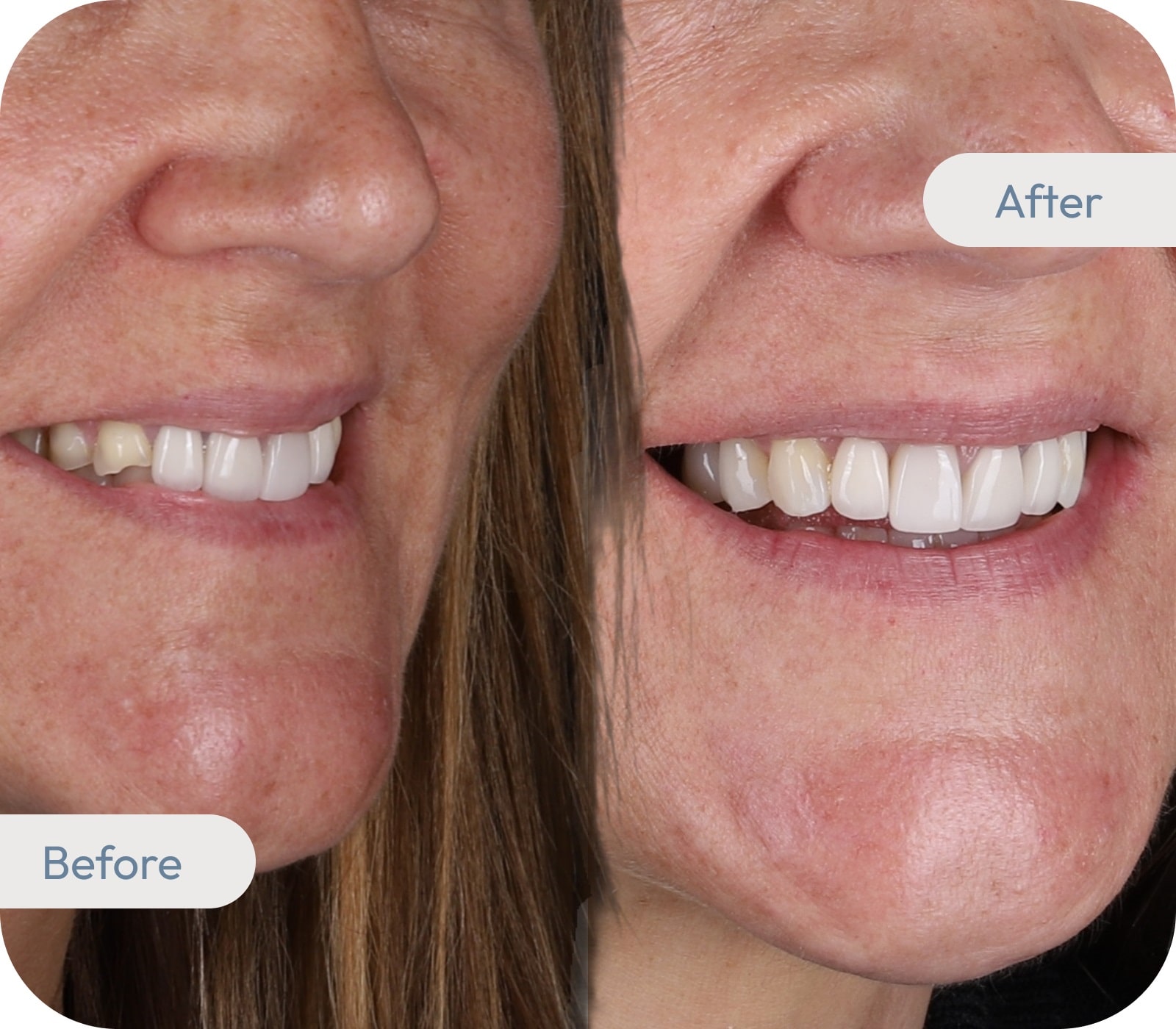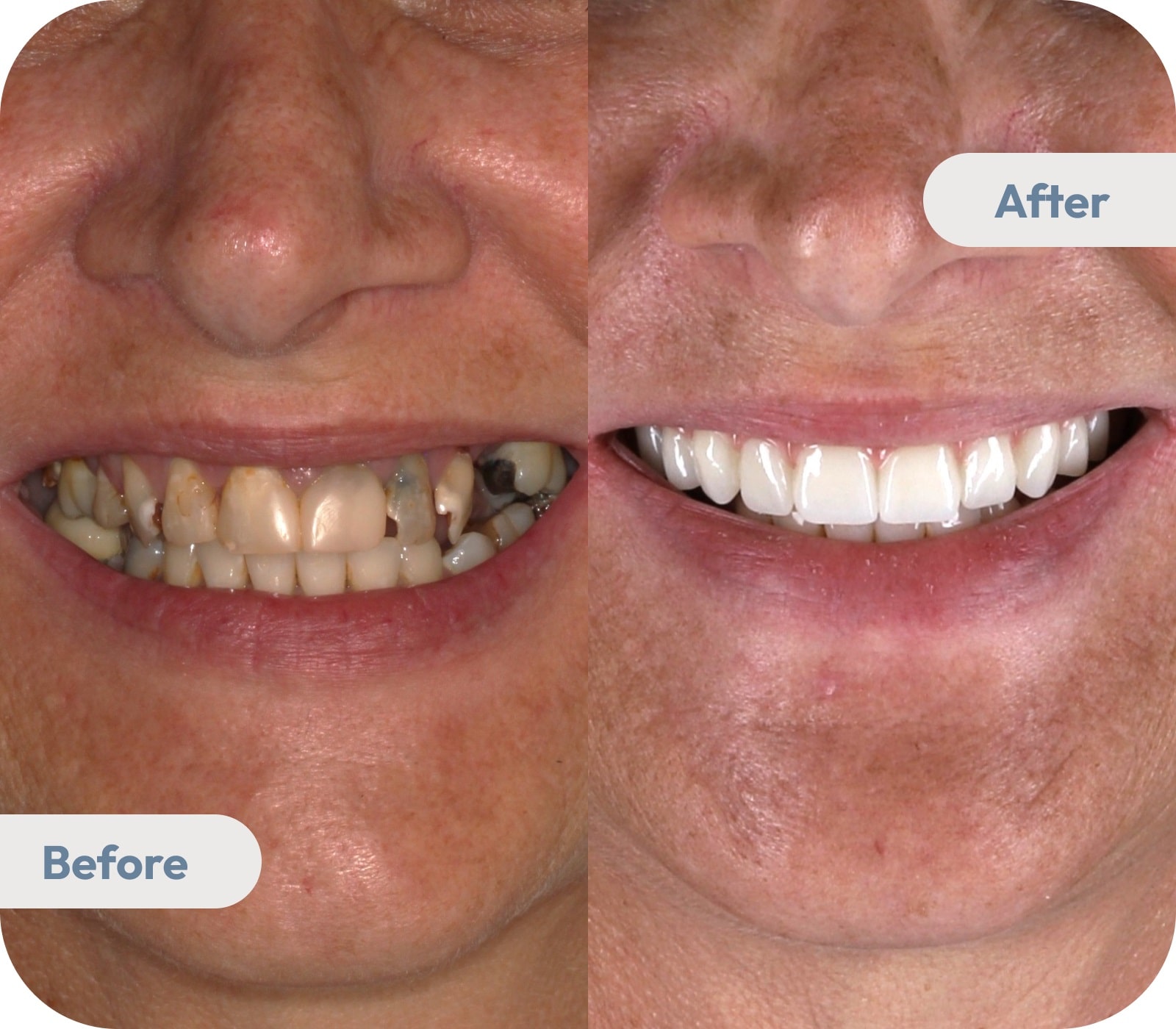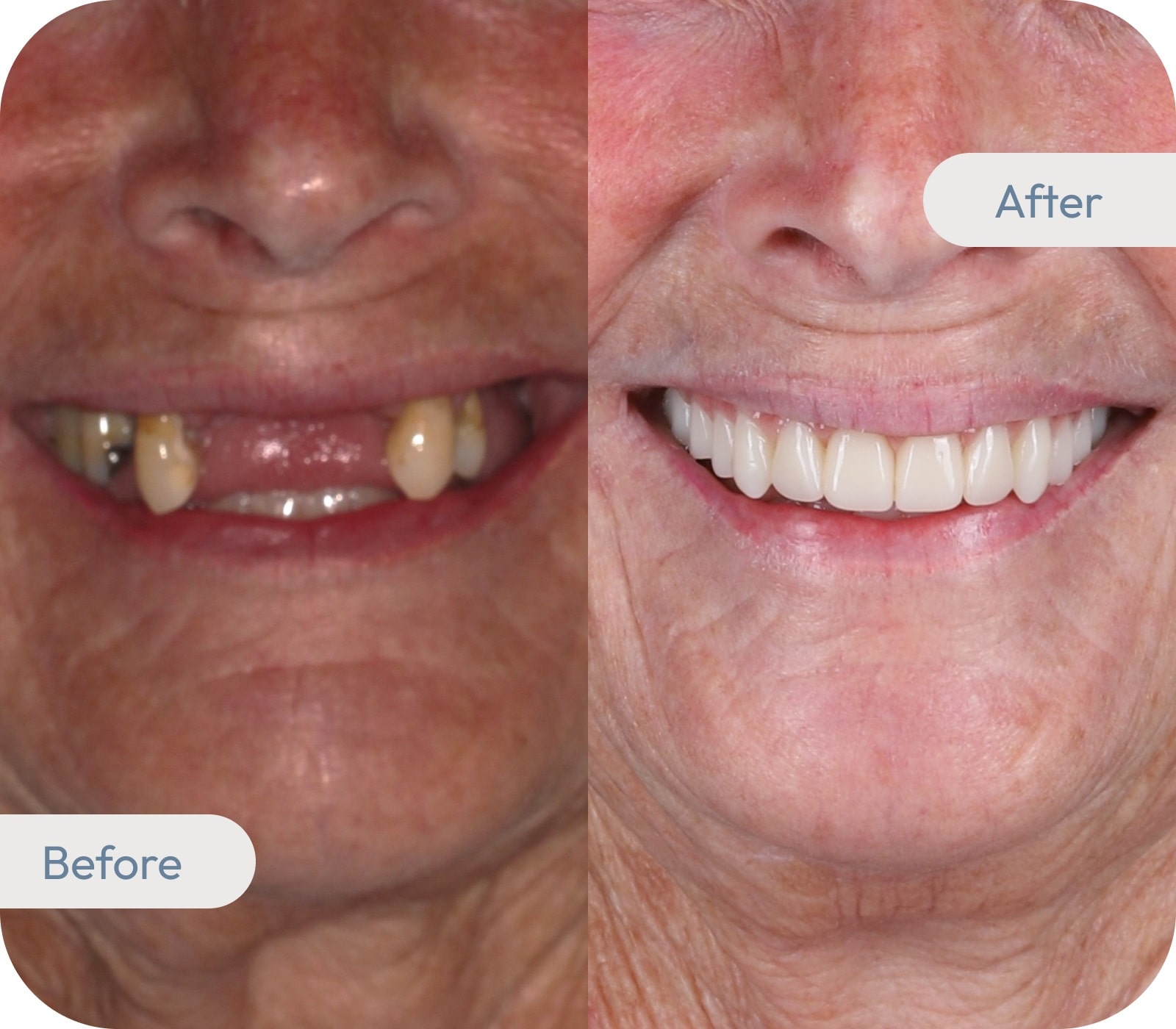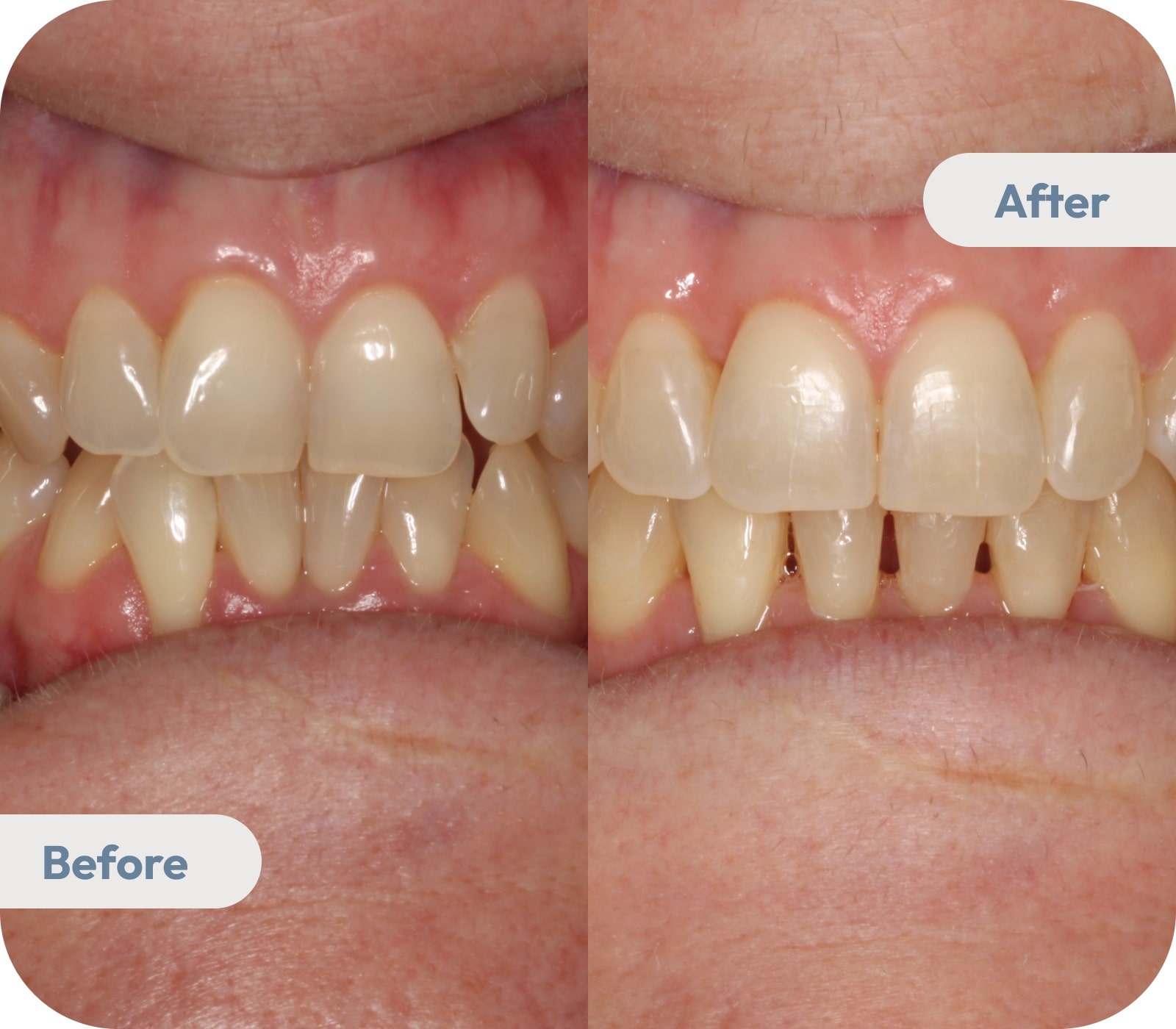Missing Teeth? We’re Here to Help
We’ve Got Options for
“I Have Missing Teeth” Concerns
Eversmile Dental offers a range of tooth replacement options, including implants and bridges, to help restore your smile. Each treatment is tailored to support comfort, function, and long-term oral health.
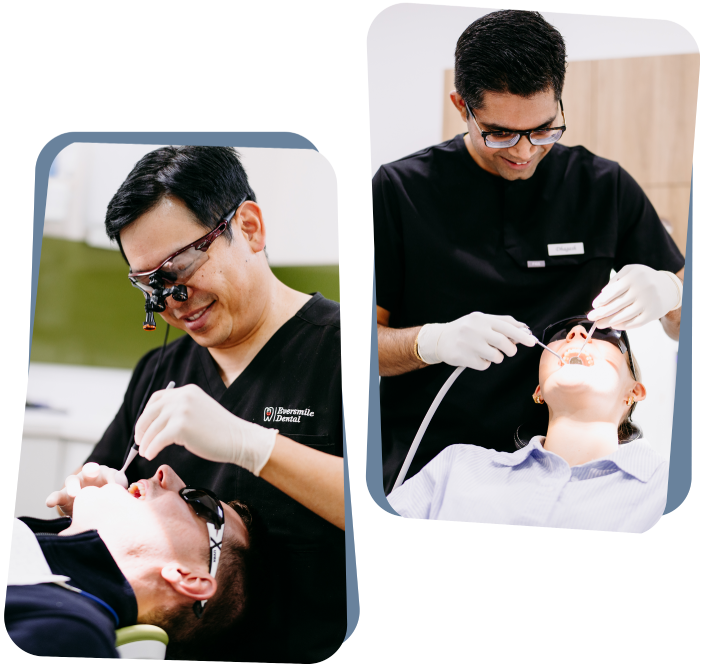
Missing Teeth Can Impact More Than Just Your Smile’s Appearance
Missing teeth can change the way you speak or chew while also impacting the alignment of your nearby teeth. This can lead to discomfort and changes in facial structure that impact your daily life. Dental treatments provide effective options for replacing missing teeth and restoring oral function. We’ll help you find the right option to suit your dental needs.
Why Replacing Missing Teeth Is Worth the Investment
- Improved FunctionMissing teeth can make chewing difficult and may affect how you speak. Replacing them helps distribute bite forces evenly again. This makes eating, speaking, and smiling feel more natural and comfortable.
- Bone PreservationWhen a tooth is lost, the jawbone underneath may begin to shrink. Tooth replacements, like dental implants, can help provide stimulation to the bone. This supports long-term facial structure and helps maintain overall oral stability.
- Natural AppearanceTooth replacement options, like dental bridges and dentures, are designed to match the shape and shade of your natural teeth. They are made to restore appearance and function so your bite remains stable and your smile looks natural.
- Good Oral HealthFilling gaps helps prevent neighbouring teeth from shifting out of place. This keeps your bite stable and balanced. It also makes daily brushing and flossing easier and more effective over time.

Explore How Our Dental Treatments Help Fill Gaps
Missing teeth can be replaced with several dental options. At Eversmile Dental, we provide implants, bridges, and dentures to support function and appearance, offering treatments tailored to suit each patient’s individual dental needs.
Start with a Dental Consultation in Bunbury
Are you ready to prioritise your oral health? Book a consultation to discuss your oral health needs and treatment options.

Smile Gallery – Before and After Treatment Examples
Explore real treatment outcomes in our gallery. These before-and-after photos show actual patients of Eversmile Dental, displayed with their consent. Outcomes vary between individuals, and results are not guaranteed. Images are unedited and taken under comparable conditions to reflect realistic treatment outcomes.
*These images display actual patients of our clinic. Every case is different, and treatment outcomes can vary according to individual conditions and needs.
Why Bunbury Turns to Us for Restoring Smiles
Restorative dentistry is about restoring and replacing teeth to maintain function, comfort, and oral health. At Eversmile Dental, we combine experience, empathy, and modern technology to deliver care that supports your long-term oral health.
-
- Local Care, Genuine Connection
- We’re more than a dental team—we’re your neighbours, your kids’ schoolmates, and your fellow locals. Living and working in Bunbury means we understand the pace of life here and the needs of the people we serve. Our care is personal because this is our community, too, and your well-being matters to us.
-
- Providing Restorative Dental Care in Bunbury Since 2006
- For nearly two decades, our team has been providing restorative dental treatments for the Bunbury community. We offer crowns, bridges, and dentures, using established dental techniques and technology. The dentists at Eversmile Dental draw on their extensive experience to guide their approach to restorative care.
-
- Restorative Treatments for Different Age Groups
- Restorative dentistry can be applicable at different stages of life, depending on individual oral health needs. From restoring damaged teeth to replacing missing ones, our team offers a range of treatment options. We also emphasise prevention and long-term care to assist patients in managing their oral health over time.
-
- Restorative Care Designed Around You
- We recognise that every patient’s needs are unique. Our team takes the time to listen carefully, explain available treatment options, and answer your questions. Together, we develop a plan that reflects your oral health needs, personal preferences, and budget. Our goal is to help you make treatment decisions that are clear and well-informed.
-
- Professional Standards in Restorative Dentistry
- Our restorative care is based on current dental standards and supported by clinical evidence. We explain the purpose of each recommended option, allowing you to make informed choices about your treatment. Our focus is on delivering appropriate care in line with recognised professional guidelines.
-
- Incorporating Modern Technology into Patient Care
- Our clinic incorporates technology such as digital scans, CBCT imaging, and in-house 3D printing into patient care. We use these tools to assist in the planning and delivery of restorative treatments, including crowns, bridges, and implants. They are integrated into the way we provide restorative dentistry at Eversmile Dental.
Frequently Asked Questions
This section provides answers to common questions about missing teeth. It helps you understand available treatment options and make informed choices about your oral health.
Is it OK to have missing teeth?
Having missing teeth can affect how you speak, chew, and how your face looks over time. Gaps from missing teeth may cause nearby teeth to shift, which can lead to bite changes. Without tooth roots, the jawbone may shrink, altering the structure that holds your teeth in place. Replacing missing teeth can help maintain oral function and may help reduce the risk of further dental issues.
It’s also important to consider that missing teeth can make eating certain foods difficult, which may affect diet variety. Modern tooth replacement options aim to restore function and appearance.
What are the side effects of missing teeth?
Missing teeth can cause more than appearance concerns, leading to issues with eating, speaking, and long-term oral health. Below are the common side effects you should be aware of:
- Difficulty Chewing and Eating Comfortably: Missing teeth can make it difficult to chew crunchy foods, affecting your ability to enjoy a variety of foods. This often leads people to choose softer foods, which may result in a less balanced and nutritious meal plan.
- Changes in Speech and Pronunciation: Tooth gaps, especially in the front, can make it harder to pronounce certain words clearly. This may lead to frustration or embarrassment when speaking in social or professional settings.
Tooth replacement options are available that may help address these concerns and support your oral health. Your dentist will suggest a suitable tooth replacement option based on your personal dental health and treatment requirements.
What happens if missing teeth are not replaced?
Losing a tooth can feel like “just a gap,” but leaving missing teeth unaddressed can lead to bigger problems. Here’s what can happen if missing teeth are not managed:
- Your Other Teeth Can Shift Out of Place: A missing tooth can cause neighbouring teeth to tilt or shift into the gap gradually. This shifting can affect your bite, making it harder to chew and causing further alignment issues.
- Chewing and Speaking may Become Difficult: Missing teeth can make everyday activities like eating certain foods or speaking clearly more challenging. You may find yourself avoiding harder foods or feeling self-conscious when talking.
- Bone Loss in the Jaw can Occur: Without the tooth’s root, the jawbone beneath can slowly weaken due to a lack of stimulation. This bone loss can affect your facial structure, leading to a sunken appearance and changes to your smile.
- Your Risk of Gum Disease can Increase: Gaps left by missing teeth can trap bacteria and food, making it harder to keep the area clean. This may lead to a higher chance of gum disease, harming remaining teeth and affecting your overall oral health.
- Jaw Joint Problems (TMJ Issues) may Develop: An imbalanced bite caused by missing teeth can place additional stress on your jaw joints. Over time, this can lead to discomfort, clicking sounds, or even jaw pain.
Addressing missing teeth early may help reduce the risk of further dental issues and support long-term oral health.
What are the options for replacing missing teeth?
When you’re missing one or more teeth, there are reliable ways to restore the appearance of your smile. These options can also help restore function for eating and speaking. Below are the most common options we might recommend:
- Dental Implants: Dental implants are titanium posts placed in the jawbone to support a replacement tooth or bridge securely in place. They look and feel like natural teeth and can help prevent bone loss in the jaw. However, they are not suitable for everyone and require healthy gums and adequate bone structure.
- Dental Bridges: A dental bridge fills the gap of missing teeth by attaching to the healthy teeth next to the gap. Bridges are securely attached, providing a stable option that restores your ability to chew and improves your smile’s appearance. Keep in mind that the supporting teeth will need to be prepared, which involves removing a portion of their enamel.
- Dentures: Dentures are custom-made, removable dental appliances designed to replace multiple missing teeth or a full arch. They restore your ability to speak and eat but might need periodic adjustments to maintain a comfortable, secure fit.
- Dental Crowns: Dental crowns are used to restore teeth that are damaged, weakened, or severely worn down. While crowns themselves do not replace missing teeth, they are often part of larger treatments like bridges or implant restorations. A crown protects and covers a damaged tooth, helping restore its shape, strength, and natural appearance.
Every patient’s needs are different, and tooth replacement options should be chosen carefully based on your dental needs. We will guide you in choosing the most suitable option after assessing your oral health, lifestyle, and personal preferences.
Is it embarrassing to have missing teeth?
It’s common to notice changes when you have one or more missing teeth. Missing teeth can affect how you chew, speak, and maintain oral hygiene, which may lead to further dental complications. Many adults experience this, whether from injury, tooth decay, or gum disease. Missing teeth are manageable, and there are effective treatment options available to restore oral function.
Addressing missing teeth is important, as they are a frequent dental issue in the Bunbury community. Dentists provide assessment and care for people with gaps caused by tooth loss. Discussing your needs during a consultation is the most appropriate way to explore suitable treatment options.
Can missing teeth affect appearance?
Losing teeth is a common dental issue that can affect your appearance. Treatment options are available to help restore oral function and replace gaps in your smile. Addressing missing teeth can support chewing and speech while maintaining oral health. Dentists provide tailored options to suit individual needs and treatment requirements.
What’s the most affordable way to replace missing teeth?
When it comes to replacing missing teeth, affordability is often a key concern for patients in Bunbury. While the right choice depends on your individual needs, here are the most cost-effective options to consider:
- Removable Partial Dentures: Removable partial dentures are usually the most affordable option for replacing one or several missing teeth. These custom-made appliances are designed to fit around your remaining teeth and can be taken out for cleaning and sleeping.
- Full Dentures: Full dentures are a cost-effective option for people who have lost most or all of their teeth. They help restore chewing function and improve the appearance of your smile. Advances in materials mean modern dentures are more comfortable and natural-looking than older designs.
- Cost and Longevity: While dentures are typically less expensive upfront compared to other options, they may require adjustments or replacements over time. It’s important to weigh the lower initial cost against the potential need for maintenance or future replacements.
Health Funds & Payment Plans: Many health funds offer benefits that cover part of the cost of dentures. Flexible payment plans are available to make tooth replacement treatments more accessible for patients. They help reduce upfront costs, easing the financial burden for those seeking affordable options. To make treatment more affordable, we partner with leading health funds and offer payment plan options to support our patients.
- Preferred Provider for:
- HBF Member Plus
- BUPA Members First
Medibank Members’ Choice
- Payment Plans: SuperCare (assists in accessing superannuation for eligible dental treatments)
- Preferred Provider for:
Choosing the right tooth replacement option is a personal decision based on your oral health, lifestyle, and budget. A thorough consultation will help you understand which option provides the right value for your dental needs.
At what age do most adults start losing teeth?
Tooth loss can happen at any age, but there are certain stages in adulthood when it becomes more common. Below, we explain when tooth loss often occurs in adulthood and the common reasons why it usually happens.
- Late 20s to Early 30s: Some adults may begin losing teeth in their late 20s or early 30s due to unaddressed dental problems. Common causes include tooth decay, poor oral hygiene, or dental injuries that were not properly managed over time. These cases are usually preventable with regular dental care and early intervention.
- Mid-30s to 40s: In this stage, gum disease becomes one of the leading causes of adult tooth loss. Gingivitis, if not managed, can develop into periodontitis, which can damage the tissue and bone supporting the teeth. Many people begin to notice signs like loose teeth or gum recession during these years.
- 50s and Beyond: Tooth loss becomes more common for adults in their 50s and beyond due to age-related oral health challenges. Chronic health conditions such as diabetes can increase the risk of losing teeth in older adults. Long-term wear, old dental work, and bone changes can also contribute to tooth loss.
- Across All Ages: Regardless of age, tooth loss can happen earlier in adults who smoke, have poor nutrition, or avoid regular dental visits. Health conditions and medications that affect the immune system or saliva flow can also increase the risk of tooth loss.
Understanding when and why adults may lose teeth helps us support patients with personalised care and early treatment. If you notice changes in your teeth or gums, it’s important to seek professional dental advice early. It’s never too late to get support for your oral health and protect your teeth for the future.
Can I get veneers if I have missing teeth?
If you have missing teeth, veneers are not designed to replace them, as they only cover existing teeth. Other treatment options, like implants, bridges, or dentures, are recommended to replace missing teeth and restore oral function. Here’s a simple explanation of why veneers cannot replace missing teeth:
- Veneers Only Cover Existing Teeth: Veneers are thin shells that are bonded to the front surface of existing teeth to alter their shape or colour. If a tooth is completely missing, there is no tooth surface to which a veneer can attach. Because of this, veneers cannot be used to replace missing teeth.
- Missing Teeth Require Replacement Options, Not Cosmetic Covers: When teeth are missing, treatment focuses on replacing the tooth structure, not just covering it up. Options like implants, bridges, or dentures are designed to fill the gap left by a missing tooth and restore oral function.
- Veneers may still be Used Alongside Other Treatments: Veneers can be used to change the appearance of teeth that are chipped, discoloured, or uneven. If you have missing teeth, veneers may be combined with other replacement options as part of a broader treatment plan.
- A Personalised Treatment Plan is Essential: Every patient’s needs are unique, so treatment depends on how many teeth are missing and their oral health. Bone density and the condition of surrounding teeth also play an important role in choosing the right replacement option. A thorough consultation will help determine the most suitable combination of treatments for function and aesthetics.
Veneers cannot replace missing teeth because they need existing teeth to bond to and cover. However, veneers may be used to change the appearance of natural teeth when combined with suitable tooth replacement options. The most appropriate way to determine what suits your needs is to have a personalised consultation with your dentist.
Is losing teeth a disability?
Losing teeth is not officially classified as a disability, but it may affect certain daily functions such as chewing and speaking. Missing teeth can cause difficulties with chewing, which may influence food choices and digestion over time. They may also affect speech by altering the formation of certain sounds, which can reduce clarity when speaking. These functional limitations highlight the importance of seeking professional dental advice for replacement options.
Although not a disability, tooth loss can lead to long-term oral health problems if not managed. Bone loss in the jaw is a common consequence that may change the oral structure over time. Replacing missing teeth may help restore oral function and maintain dental health.
Book Your Appointment Online or Call Our Bunbury Dental Clinic
Book an appointment with our dentist in Bunbury to discuss your oral health needs. We provide tailored dental treatments and clear information to support informed decisions about your dental care.
